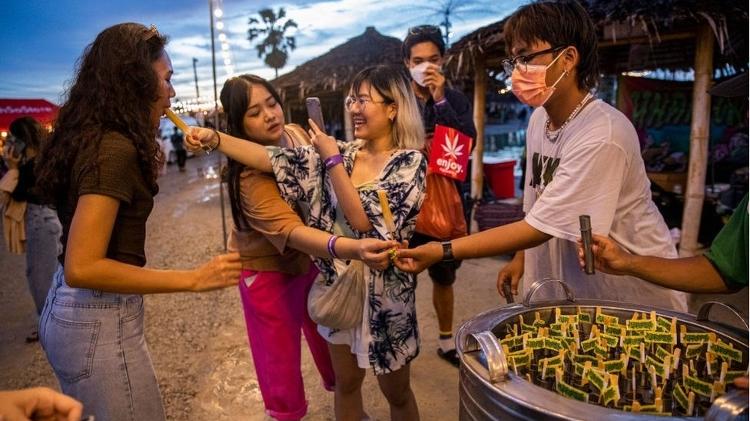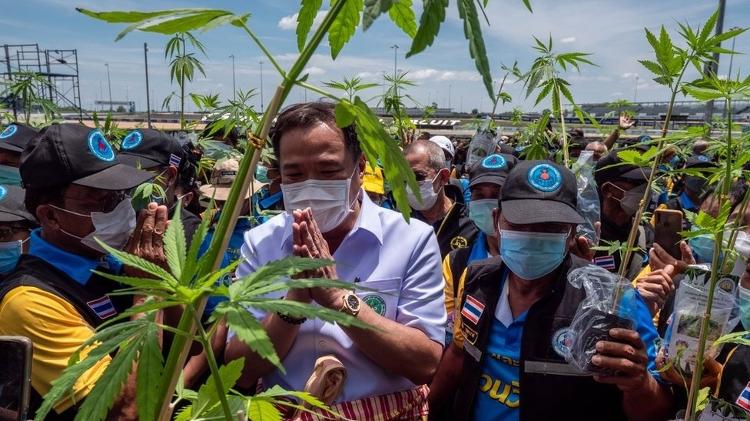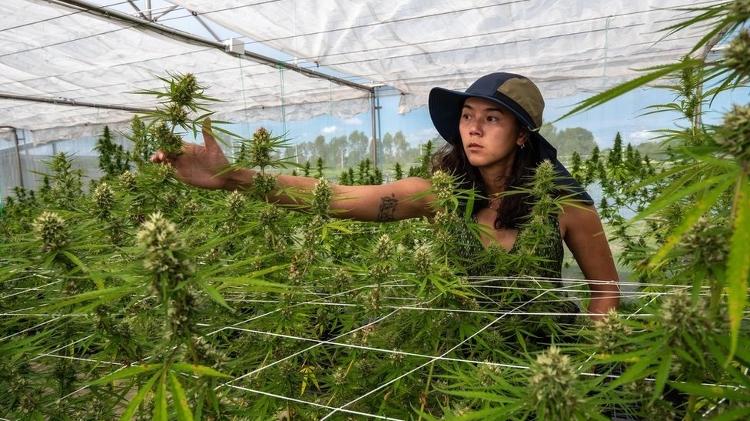Thailand has one of the most liberal cannabis legal regimes in the world. How did that happen?
Thailand legalized the cultivation and consumption of marijuana this month, reversing a strict approach to long prison sentences and even the death penalty for drug offenses. The BBC’s Southeast Asia correspondent, Jonathan Head, reports on what was behind the dramatic change.
Twenty-one years ago, I had one of the most remarkable experiences of my journalism career. We were invited to watch and film the execution by the firing squad of five prisoners, four of whom were convicted drug dealers, at Bangkok’s Bangkwan Prison.
The look on these men’s faces as I walked towards the execution house – with the clatter of chains on their legs – is something I will never forget.
- Legal marijuana market moves R$130 million in Brazil, users still being arrested for ‘dandruff’
- How does marijuana affect our cognition and psychology, according to new research?
This was part of then-Prime Minister Thaksin Shinawatra’s “war on drugs”, which resulted in the deaths of hundreds of suspected drug dealers.
Thaksin’s campaign was popular. Thais were concerned about the harmful effects of drugs such as methamphetamine on their communities and were willing to ignore the shocking human rights violations that came with severe repression.
Other countries in the region, particularly the Philippines, followed the same punitive approach after Philippine President Rodrigo Duterte took office in 2016. For decades, the death penalty has been used for drug trafficking in Singapore and Malaysia. Tourists arriving in Southeast Asia are warned of the harsh penalties they will face if caught with marijuana, even in small quantities.
Despite all this, it’s hard to believe what we’ve seen in recent weeks has taken place in Thailand.
Cafes and stalls openly sell all kinds of cannabis products and display potted flowers. The architect of the new law, Minister of Public Health Anutin Charnvirakul, was seen applauded by farmers who tried a typical dish containing the marijuana-based spice and hoped it would generate a new source of income for them.
At the same event, elderly Thai women had fun tasting marijuana drinks and queuing up to receive one of the millions of free cannabis plants the government is handing out.
The new law seems to give Thailand perhaps the most liberal approach to cannabis anywhere in the world. Although there are limits to marketing the product, people can grow and consume the plant as much as they want.
‘Dreamy’
“One thing is clear. In Thailand you can no longer be arrested just for using cannabis,” says Tom Kruesopon, a pioneering entrepreneur who helped persuade the government to change its approach. “You can go to jail for doing other things like smoking in public, rioting, or growing and selling marijuana without Food and Drug Administration approval. But Thailand is the first country in the world where you can’t go to jail for growing or consuming herbs.”
“It’s like a dream for us. We never thought we could go this far in Thailand,” says Rattapon Sanrak, who started a campaign to legalize marijuana after seeing its medical benefits while studying in the US.
His two grandparents, father and mother died of cancer. When he hurried back from the US to care for his mother, he tried to persuade her to use marijuana products to ease her pain and was unable to gain access to substances considered illegal at the time.
What explains this dramatic turn in drug policy in a country run by a conservative military?
One reason for this is partisan politics. Anutin made marijuana legalization his party’s main policy in the 2019 elections. The party’s largest constituency is in Thailand’s poor rural northeastern region, and the new drug policy has attracted farmers who make a living by growing rice and sugar, and they need a new strain. crop.
Anutin gave a speech earlier this month at his political base in the Buriram district where he spoke about the new law and said it has delivered on its promises. He believes in the medical benefits of legalization and allows poorer Thais to develop their own treatments instead of paying for expensive chemicals.
The change in drug policy is also closely related to the business world. Kruesopon estimates that the cannabis business will generate $10 billion in its first three years, not taking into account cannabis tourism, where people come to Thailand specifically for therapies and treatments using cannabis extracts.
Kruesopon opened the first clinic in Bangkok focused solely on this type of treatment. Some of Thailand’s biggest companies are already looking for ways to monetize the cannabis economy.
By liberalizing the law so quickly and completely, the government hopes to seize the lead over its neighboring countries, many of which are reluctant to follow Thailand’s path.
But there is a third factor behind the new marijuana policy: There are reflections on the rigid approach to drug use that began seven years ago at a time when Thailand was ruled by a military junta.
The country has some of the world’s most overcrowded prisons, with three-quarters of inmates being held for drug offenses, many of which are considered petty crimes. This not only drew international criticism of the poor conditions in which the prisoners lived, but also cost the government money.
In 2016, Military Justice Minister General Paiboon Kumchaya declared that the war on drugs had failed and another less punitive method was needed to deal with narcotic abuse.
- From the drug use room to ‘zero tolerance’: how cities worldwide have dealt with ‘cracolândias’
- Six ‘criminal queens’ controlling drug trafficking in Central America
When Anutin unveiled his cannabis policy with all its enticing economic benefits, he saw room for debate—yet he says he’s put a lot of effort into moving forward. Another consequence of the law change is the release of more than 4,000 people from prison on cannabis-related charges.
The government was unprepared for the enthusiastic support that drug policy has received across Thailand since the new law was passed.
mystery chicken
The plant is now ubiquitous: in ice cream, garnishing classic Thai dishes, and in new smoothie recipes. There is even a sale of meat from cannabis fed chickens. The new law legalizes nearly everything related to marijuana.
The government is now preparing additional regulations regarding its use. Officially, their position is that the law only allows the use of cannabis for medicinal purposes, not recreational, but it is difficult for authorities to understand how to make that distinction.
“We all know by studying other markets that real money is used for entertainment,” says Chidchanok Chitchob, who calls herself a marijuana enthusiast. His father, a powerful political figure in Buriram, was one of the first to jump aboard a Thai marijuana wagon. “If we think of it as a really good product for the economy, I think it’s a good step in that direction,” he said.
He’s been experimenting with different varieties of the plant to help local farmers grow the right species for their area.
Kruesopon said he doesn’t see a problem with further regulation. It advocates the prescription sale of marijuana only from licensed dealers and never sells it to anyone under the age of 18.
“You don’t need to think too much about these. What already applies to cigarettes can be used to marijuana. There are already laws to help control smoking and alcohol use – just use the same laws.”
This is an unusual and bold step taken by the Thai government into a brave new world. The rest of the region is watching to see if legalization is working.
– This text was originally published at https://www.bbc.com/portuguese/internacional-61879208.
Did you know that the BBC is also on Telegram? subscribe to the channel.
Have you watched our new videos on YouTube?? Subscribe to our channel!
source: Noticias
[author_name]


